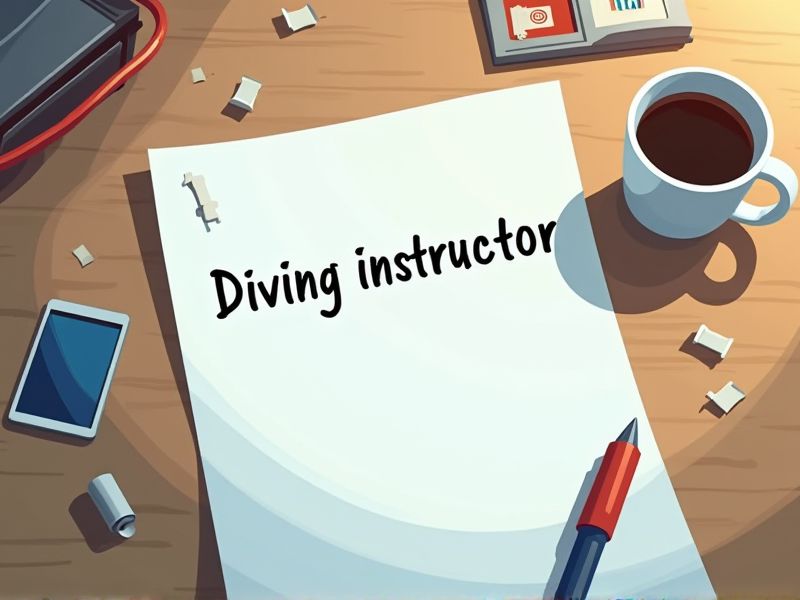
Becoming a diving instructor involves guiding individuals through underwater environments, which inherently presents risks. Certifications ensure that instructors possess the skills to handle emergencies, understand marine ecosystems, and impart safe diving practices. Trainees benefit from instructors with certified expertise, ensuring a robust learning experience. Here are some important certifications you may need to become a diving instructor.
PADI Divemaster Certification
PADI Divemaster Certification provides foundational leadership skills essential for becoming a diving instructor. This certification builds expertise in dive supervision and dive operations logistics. Having these skills ensures instructors can effectively manage dive courses and foster a safe learning environment. Compliance with PADI's progressive training system requires candidates to attain Divemaster status before qualifying for an instructor role.
PADI Instructor Development Course (IDC)
PADI Instructor Development Course (IDC) is required because it equips diving instructors with comprehensive training techniques that enhance their teaching effectiveness. This course provides a standardized curriculum that ensures divers receive consistent and safe instruction across the globe. Completion of the IDC allows instructors to be internationally certified, thereby expanding their professional opportunities within the diving industry. The IDC also focuses on risk management skills, critical for ensuring diver safety during training and exploration activities.
PADI Open Water Scuba Instructor Certification
PADI Open Water Scuba Instructor Certification is essential because it ensures instructors are equipped with the necessary skills and knowledge to teach diving safely. The certification provides a standardized curriculum, which maintains a high level of competency across the diving industry. Holding this certification can increase job opportunities since many dive centers require it as a prerequisite for employment. It also fosters a sense of trust and credibility among students, knowing their instructor is qualified to handle various underwater scenarios.
Rescue Diver Certification
Rescue Diver Certification equips instructors with vital skills to manage emergencies, increasing diver safety. Instructors understand problem prevention, which reduces the risk of accidents during dives. This certification enhances confidence among students, knowing their instructor can handle challenging situations. It also fulfills a common prerequisite for advanced diving leadership roles, leading to more career opportunities.
Emergency First Response Instructor Certification
Possessing Emergency First Response Instructor Certification equips diving instructors with vital skills to effectively teach emergency care to divers, increasing overall safety during underwater activities. When emergencies arise, the ability to provide accurate first aid and CPR can reduce risks and prevent escalation of injuries. Diving instructors with this certification can ensure their students are well-prepared for unexpected situations, enhancing their confidence and trust in diving experiences. Regulatory bodies often require this qualification to establish a standardized level of emergency readiness, supporting both legal compliance and instructor credibility.
CPR/AED Scuba Instructor Certification
Scuba diving involves potential risks, and a CPR/AED certification equips instructors to respond effectively in emergencies. When an underwater incident occurs, immediate action can be crucial; having CPR/AED skills ensures the instructor can provide life-saving assistance. Divers rely on instructors not only for guidance but also for safety, and possessing this certification increases their trust and confidence. Standards in the diving industry often require instructors to maintain this certification to adhere to safety regulations.
Nitrox Certification
Nitrox certification allows diving instructors to teach enriched air diving, expanding their range of courses and increasing their marketability. Using nitrox can reduce nitrogen uptake, enabling instructors and their students to enjoy longer bottom times compared to regular air. Familiarity with nitrox minimizes the risk of oxygen toxicity, ensuring safer dives for both instructors and trainees. Nitrox proficiency is often preferred by dive operators, aligning with industry standards and enhancing employment opportunities.
Deep Diver Certification
Deep Diver Certification equips instructors with the necessary skills to safely guide students in underwater environments that exceed typical depths, enhancing safety. It ensures that instructors possess comprehensive knowledge about managing potential risks associated with deeper dives. This certification builds credibility and trust among students, as it demonstrates the instructor's advanced expertise. Agencies often require this certification for instructors to lead specialized diving courses, aligning with industry standards.
Wreck Diver Certification
Wreck diver certification equips diving instructors with specialized skills in navigating and assessing underwater wreck structures, which is essential for safety and effective teaching. The certification provides in-depth knowledge on managing the risks associated with wreck penetration, crucial for instructing students in these environments. Understanding the unique ecosystem of wreck sites enables instructors to educate divers on both preservation and interaction. Certification ensures adherence to international standards, enhancing the credibility and trustworthiness of the instructor.
Specialty Instructor Certification
A Specialty Instructor Certification allows a diving instructor to teach specific types of dives, which in turn leads to a broader skill set and expertise. This certification often results in enhanced credibility and trust from potential students, as instructors are qualified to provide training in specialized areas such as wreck or deep diving. The ability to offer specialty courses can increase the instructor's marketability and lead to higher income opportunities. Furthermore, the certification process ensures that safety standards are maintained across a range of diving environments, reducing the risk of accidents.
Summary
By obtaining certifications, you can enhance your diving instruction skills, leading to increased credibility and trust among students. As a result, students often feel more confident and safe, boosting your class enrollments. The certifications also expand your teaching scope, allowing you to offer specialized courses. This diversification often results in higher income and career opportunities in the diving industry.
